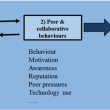MAKE-IT
Collective Awareness Platforms for the Maker Movement: Peer Production, Value Creation and Governance
The powerful tools provided by ICT software and hardware are revolutionizing the way we make tangible as well as intangible objects. Over the past ten years, the internet has revolutionised and democratised, publishing, broadcasting and communication. Make-it stands for making tangible objects specified and designed as virtual ‘bits’ which can be shared globally but then reproduced as things which manifest themselves locally - bluring the interface between the virtual and the physical sphere if not disappear altogether. As a shorthand term, this is being called the Maker Movement, although this label hides much complexity and variety.
Collective Awareness Platforms (CAPs), resting on ICT systems creating both distributed and situational awareness collectively and individually, offer new opportunities to communities and networks of people and organizations to innovate, design and make physical products based on the manipulation and sharing of virtual bits. CAPs bring together the creative potential of a wide range of people and allow expertise and ideas to be shared and built. They can enable more sustainable consumption patterns and lifestyles through behavioural as well as system change. This can result in wholly new forms of mass customization, empowering people and communities to become more self-reliant as well as more connected and collaborative in learning about and creating their physical world and the tangible things they use. Added to this, CAPs can contribute both to greater awareness of their own social and economic impact, as well as contribute directly to constructing a more circular economy. This is achieved though stimulating resource efficiency, re-using materials and energy, and re-designing the inputs of a production process as outputs of other processes, and its own outputs as inputs to yet other processes, so that the amount of ‘waste’ moves towards zero.
Given the variety of Maker Movement manifestations, even at this early stage of its development, the MAKE-IT project studied the emergence and development of a range of different types of maker communities which are enabled by CAPs. Cases included:
- the local makers ecosystem in Copenhagen
- the link between bottom-up maker communities and established smart industry parties in the Netherland
- the leading FabLab in Barcelona and its European and global FabLab networks
- the online network surrounding the Arduino open source hardware and software community focused on Italy
- the Mini Makers Faire promoting self-produced solar panels in Estonia, and. In a cross-case analysis, externally valid research findings will be synthesized.
The project focused on three areas of research and understanding:
- Peer production: the mechanisms driving the behavior to establish or join a maker community, learn, share, collaborate and realize new forms of production.
- Value creation and impact: the ways in which, and the extent to which, makers communities using CAPs create and capture financial, social and environmental value, including through new forms of bottom-up business-, social- and sustainable-models, transversing between non-monetised and monetised accounting frameworks.
- Governance: the ways that makers communities are organized, the legal and regulatory frameworks that promote or retard them, their IPR implications, and the interfaces they have with their institutional and policy environments.
Together, the findings from these three areas informed recommendations for makers communities themselves, and their implementation through CAPs, offered strategic advice for industry and gave recommendations at the level of national and European policy makers. Added to this, the project resulted in a future research agenda for further improving our understanding of makers communities.
Mitarbeiter/innen:
- Magª. Dr. Elisabeth Unterfrauner (Projektleitung)
- Dr. Claudia Magdalena Fabian
- Dr. Margit Hofer
- Dr. Barbara Kieslinger
- Magª. Maria Schrammel
- Dr. Johannes Simon
- Dr. Christian Voigt
Bereich: Technik & Wissen
Verwandte Artikel:
Tags: maker movement, makers
Typ: Forschung
Programm: H2020
Projekt Status: Abgeschlossen
Laufzeit: 24 Monate
Von/Bis: 01/2016 - 12/2017
Webseite: http://make-it.io/















































